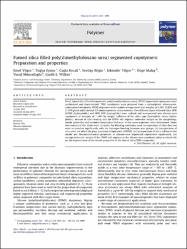Fumed silica filled poly(dimethylsiloxane-urea) segmented copolymers: Preparation and properties

Göster/
Erişim
info:eu-repo/semantics/closedAccessTarih
2011Yazar
Yılgör, EmelYılgör, İskender
Eynur, Tuğba
Söz, Çağla
Malay, Özge
Menceloğlu, Yusuf Ziya
Wilkes, Garth L.
Üst veri
Tüm öğe kaydını gösterKünye
Yılgör, E., Eynur, T., Koşak Söz, Ç., Bilgin, S., Yılgör, İ., Malay, O., ... & Wilkes, G. L. (2011). Fumed silica filled poly (dimethylsiloxane-urea) segmented copolymers: Preparation and properties. Polymer, 52(19), 4189-4198.Özet
Novel fumed silica filled thermoplastic poly(dimethylsiloxane-urea) (TPSU) segmented copolymers were synthesized and characterized. TPSU copolymers were prepared from a cycloaliphatic diisocyanate, aminopropyl terminated PDMS oligomers with number average molecular weights of 3,200, 10,800 and 31,500 g/mol and 2-methyl-1,5-diaminopentane chain extender. Two different types of fumed silica HDK H2000 (hydrophobic) and HDK N20 (hydrophilic) were utilized and incorporated into silicone-urea copolymers in amounts of 1–60% by weight. Influence of the silica type (hydrophilic versus hydrophobic), amount of silica loading and the PDMS soft segment molecular weight on the morphology, tensile properties and modulus-temperature behavior of the nanocomposites were determined. Major observations of this study were: (i) under the blending conditions used, incorporation of silica does not seem to interfere significantly with the hydrogen bonding between urea groups, (ii) incorporation of silica does not affect the glass transition temperature of PDMS, (iii) incorporation of silica influences the tensile and thermomechanical properties of silicone-urea segmented copolymers significantly, (iv) average molecular weight of the PDMS soft segment in the silicone-urea copolymer plays a critical role on the improvement of the tensile properties of the fumed silica/TPSU composites.
















